Key takeaways:
- Cannabis edibles are metabolized differently, leading to a delayed onset of effects, making it important for newcomers to start slowly.
- Building rapport with local officials fosters trust and collaboration, opening doors for meaningful dialogues about community needs and regulations.
- Engaging local officials through community events and personal stories can shift perceptions and encourage support for cannabis initiatives.
- Demonstrating tangible community benefits from cannabis edibles, such as economic uplift and improved quality of life, strengthens connections with local officials.
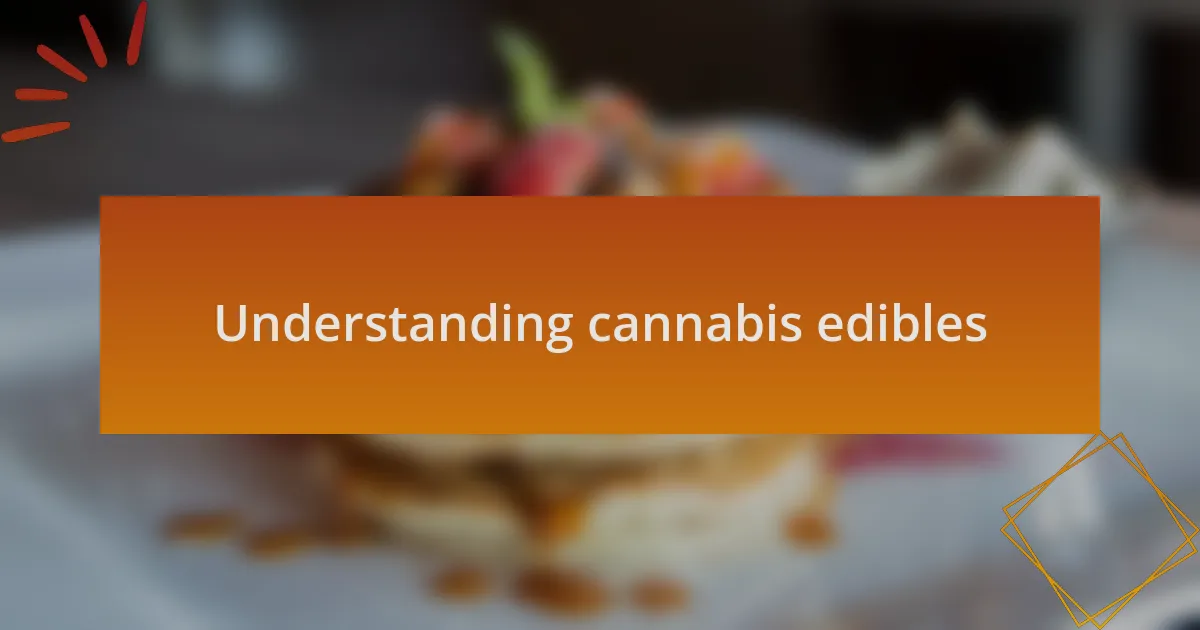
Understanding cannabis edibles
Cannabis edibles are unique because they offer a different method of consumption compared to traditional forms like smoking or vaping. I remember the first time I tried a cannabis gummy; the anticipation was palpable as I wondered how long it would take to feel the effects. This alternative delivery system captures the essence of cannabis in a form that can be both delicious and discreet.
What’s fascinating to me is how the body metabolizes cannabis edibles differently. When consumed, they’re processed through the liver, transforming THC into a more potent form that can lead to a stronger and longer-lasting high. Have you ever felt a wave of relaxation wash over you hours after enjoying an edible? That delayed onset can be surprising for newcomers, which is why it’s essential to start slowly and listen to your body.
As I explored various edible options, I was struck by the incredible variety available, from brownies to savory snacks. Some products incorporate additional ingredients designed to enhance the overall experience, such as adaptogens or superfoods. This fusion of flavors and benefits invites curiosity: how do different edibles interact with personal preferences or dietary choices? Understanding these nuances can enhance your journey into the world of cannabis edibles.
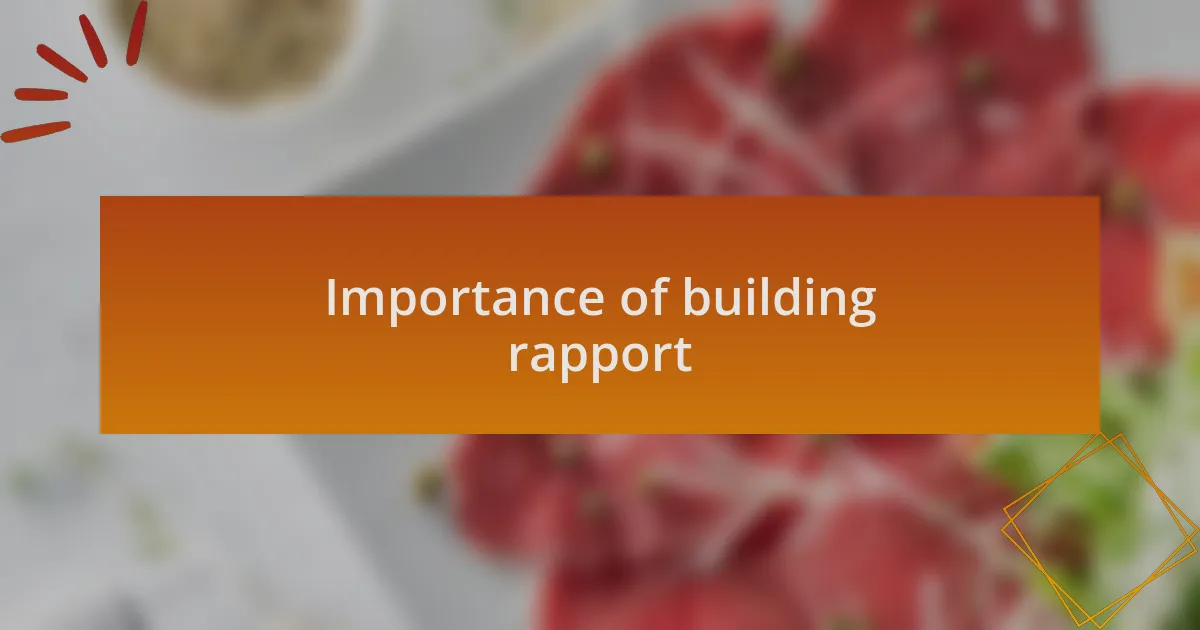
Importance of building rapport
Building rapport with local officials is crucial in fostering an environment of trust and collaboration. I recall a meeting where I took the time to share my passion for cannabis edibles and my understanding of community concerns. Their engaged responses showed that this personal connection opened doors for meaningful dialogue.
Establishing these relationships allows for a more informed discussion about regulations and community needs. When I approached local officials as partners rather than mere figures of authority, I noticed a shift in their receptiveness to my ideas. It’s amazing how a simple act of openness can encourage cooperation and lead to better decision-making outcomes for everyone involved.
When I reflect on past experiences, it’s clear that rapport impacts not just business interests but community harmony as well. For instance, I once organized a local tasting event to showcase the benefits of cannabis edibles while extending invitations to officials. This effort translated conversations into shared experiences, reinforcing the idea that we all have a stake in the conversation around cannabis. Isn’t it fascinating how genuine connections can coalesce around something as intriguing as food?
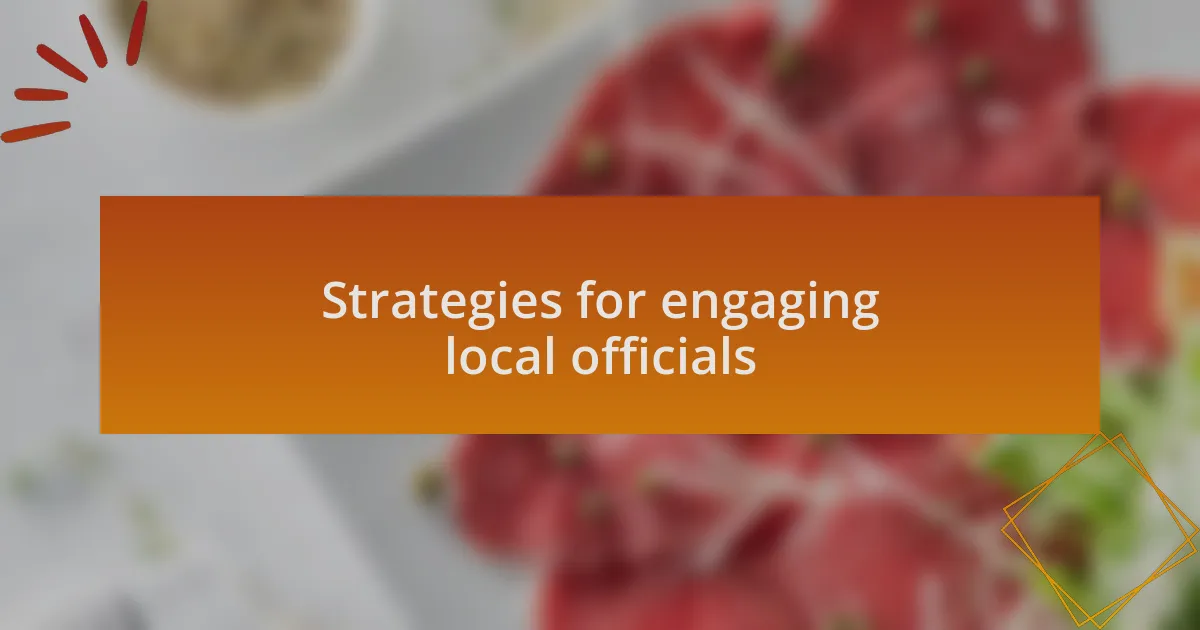
Strategies for engaging local officials
One effective strategy for engaging local officials is to invite them to participate in community events related to cannabis edibles. I remember hosting a small educational workshop where officials could taste different products and learn about their benefits directly from local producers. Seeing their expressions change as they experienced the flavors first-hand provided a unique opportunity to discuss their initial concerns and misconceptions in a relaxed setting.
Another approach I’ve found helpful is making use of one-on-one meetings to discuss specific topics that align with their interests or current community issues. During one of these intimate discussions, I shared success stories from other municipalities that embraced cannabis initiatives, highlighting positive community outcomes. By framing our conversation around mutual goals, I was able to connect on a deeper level and gain invaluable insights into their priorities.
Lastly, maintaining ongoing communication can be a game-changer in sustaining those relationships. I set aside time each month to send a thoughtful email to local officials, sharing updates on regulations or inviting feedback on any initiatives. This consistent touchpoint fosters an atmosphere of transparency and collaborative growth. Have you experienced how simple gestures can transform professional relationships into authentic partnerships? I certainly have, and it’s proven beneficial for navigating the complexities of local governance.
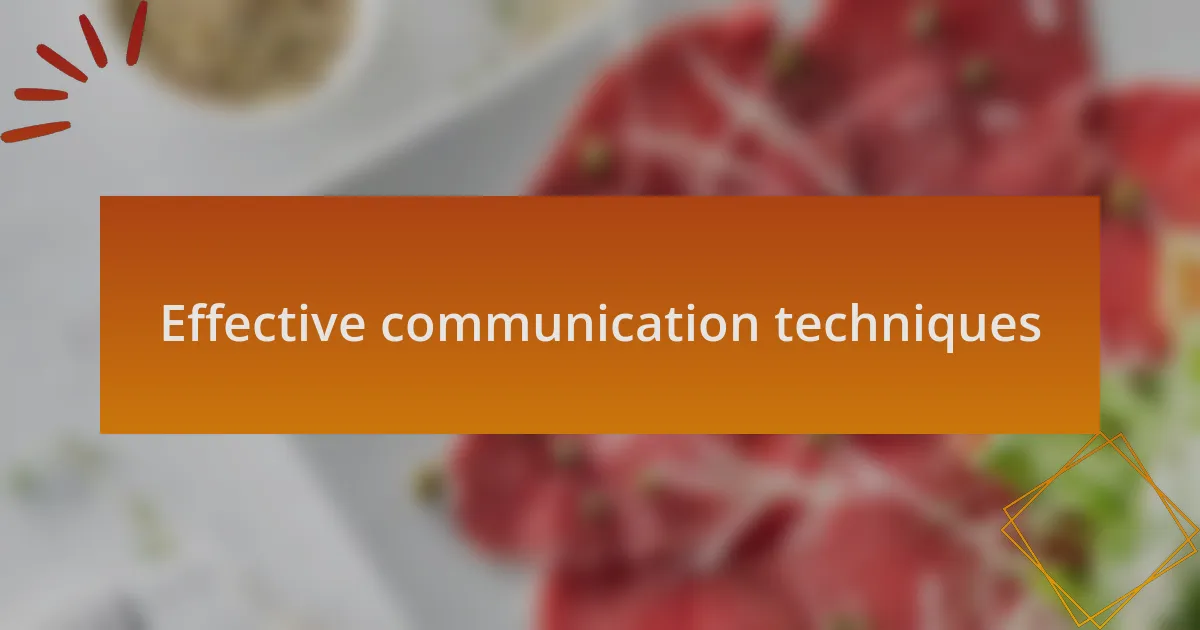
Effective communication techniques
Effective communication often hinges on finding common ground, and I’ve learned that active listening is a cornerstone of this technique. During my discussions with local officials, I make a concerted effort to not only hear their words but to genuinely understand their concerns and aspirations. I’ve noticed that when officials feel heard, they become more open to dialogue. Have you ever felt the difference when someone truly listens? It can shift the entire tone of a conversation.
Another technique I’ve found beneficial is using storytelling to connect on a personal level. When I share my journey in the cannabis edibles industry, I often relate it back to the community’s needs and values. For instance, recounting how a local edible initiative benefited struggling farmers not only illustrates a point but also evokes emotions that data alone cannot capture. This approach has allowed officials to visualize the positive impact, making it easier for them to support our initiatives.
Finally, I find that adapting my communication style to match the preferences of the official can enhance our interactions significantly. Some prefer concise, data-driven dialogue, while others thrive on detailed discussions filled with examples. By tailoring my approach, I show respect for their time and communication preferences. In my experience, this flexibility often leads to deeper discussions and fosters a more collaborative atmosphere. How do you approach differing communication styles? Adapting can truly unlock the potential of any conversation.
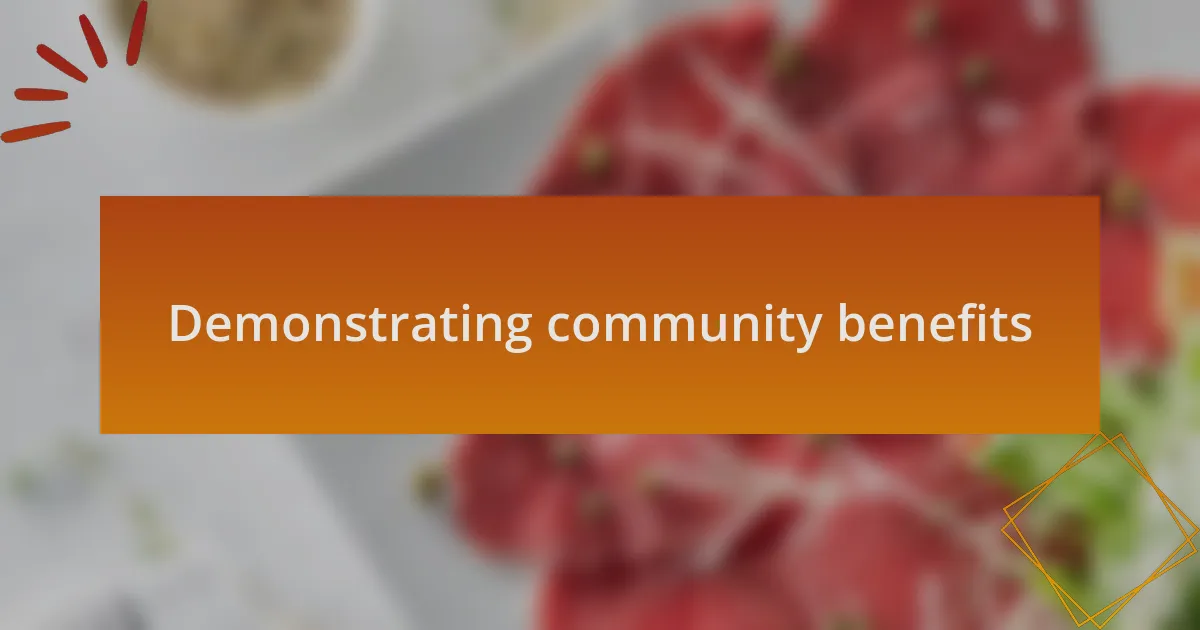
Demonstrating community benefits
When discussing the community benefits of cannabis edibles, I like to highlight the economic uplift they can bring. One moment that stands out to me was when I presented data showing how our local vendors experienced a 30% increase in sales after embracing edibles. It wasn’t just numbers on a sheet; the officials could visualize how this success translated into more jobs and increased local tax revenue. Isn’t it powerful when you can show tangible results?
I also emphasize the wellness aspect of cannabis edibles, drawing on stories of individuals I’ve met who found relief through our products. For example, I once shared the story of a grandfather in our community who, after switching to edibles from traditional medicine, saw a remarkable improvement in his quality of life. He told me how it allowed him to spend more active time with his grandchildren. That emotional connection moved the officials, reminding them that we’re not just talking about a product; we’re discussing real lives impacted for the better.
Lastly, I often focus on the potential for community engagement through local events centered around cannabis education. I remember an event we organized that brought together local farmers, buyers, and educators to discuss sustainable practices in edible production. The enthusiasm and collaboration sparked by that initiative demonstrated to officials that this industry fosters unity, innovation, and enthusiasm for local entrepreneurship. Isn’t that the kind of community spirit we all want to cultivate?
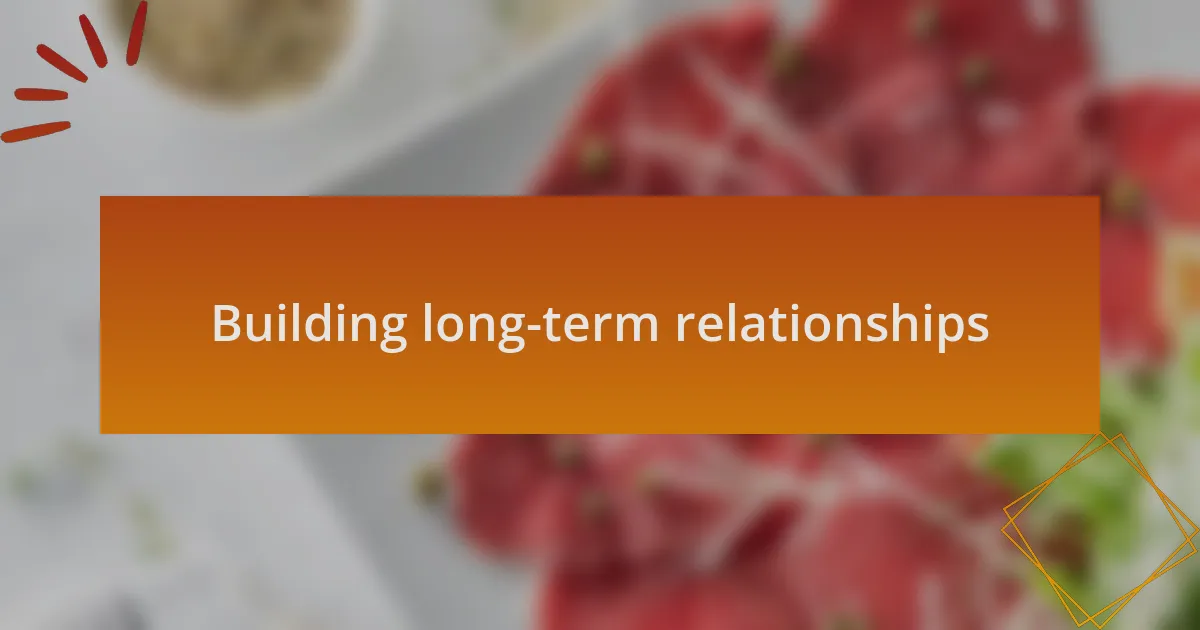
Building long-term relationships
Building long-term relationships with local officials requires trust and consistent communication. I remember a time when I invited a council member to our facility for a behind-the-scenes tour. It was a relaxed atmosphere, allowing us to chat openly about our challenges and successes. Enabling those personal connections breaks down barriers; suddenly, we weren’t just businesses and officials—we were partners working together for the community.
I’ve learned that following up on conversations and being proactive really matters in sustaining these relationships. Once, after a meeting about potential regulations, I sent a thoughtful email to the officials thanking them for their input, along with some further insights I gathered from industry peers. This not only reaffirmed my commitment to collaboration but also kept the lines of communication open. Wouldn’t it be great if everyone took that extra step to show they value the dialogue?
Ultimately, it’s about building a shared vision for the community. I had a candid conversation with a local official about our goals for educating the public on safe edible consumption. They expressed interest in co-hosting workshops, which led to a fruitful partnership. That’s what I consider the sweet spot—when both sides contribute to something bigger than themselves, it fosters an atmosphere of trust and mutual respect. How often do we see that kind of synergy in our everyday interactions?
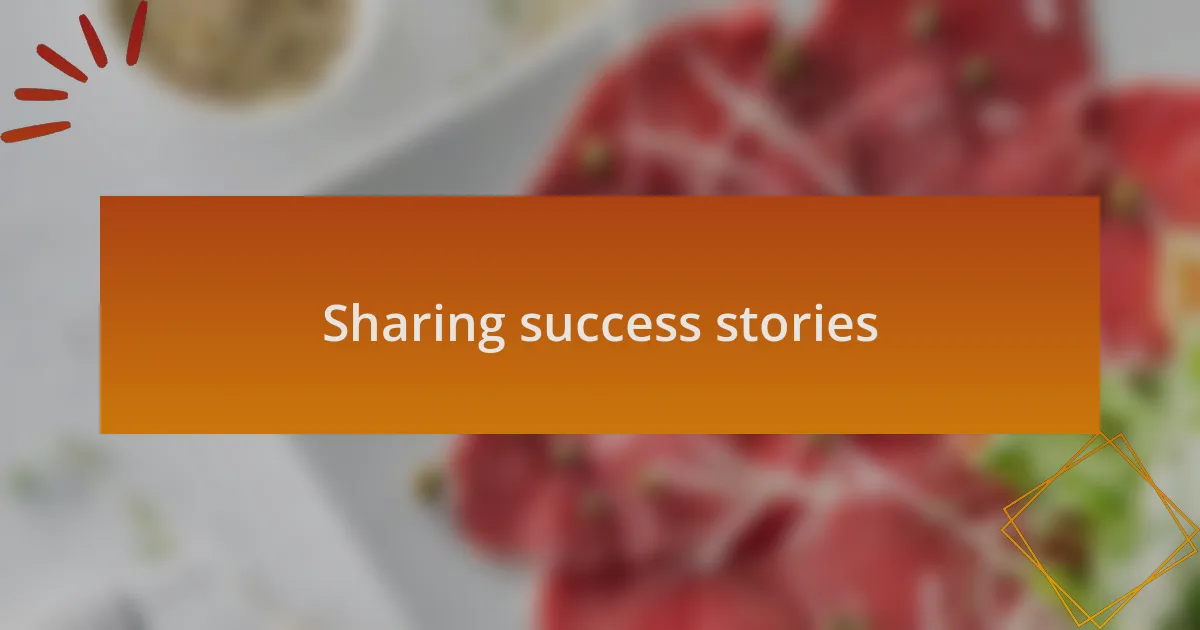
Sharing success stories
Sharing success stories can be a powerful way to strengthen those connections with local officials. I remember a meeting where I shared the positive impact our cannabis edible program had on community health initiatives. A local official visibly softened while listening, and by the end of the discussion, they were nodding along, eager to explore how we could replicate this success in their district. Isn’t it fascinating how real-life stories resonate on a deeper level than statistics?
When I showcased testimonials from community members who benefited from our products, it sparked genuine interest among the officials. One official even shared how hearing about those experiences reminded them of their own journey in local governance—highlighting moments when they tackled similar challenges. Have you ever noticed how shared experiences create a sense of unity? It’s as if we were weaving a broader narrative together, one where each story added depth to our collective mission for community wellness.
By sharing these stories of success, I’ve learned to appeal to the heart, not just the mind. Just last week, I presented our collaboration with local farmers, illustrating how it not only benefited our business but also supported local agriculture and created jobs. Seeing the officials lean in, their eyes bright with interest, made me realize how effectively we can inspire change through our narratives. Isn’t it amazing how a simple story can drive impactful conversations?